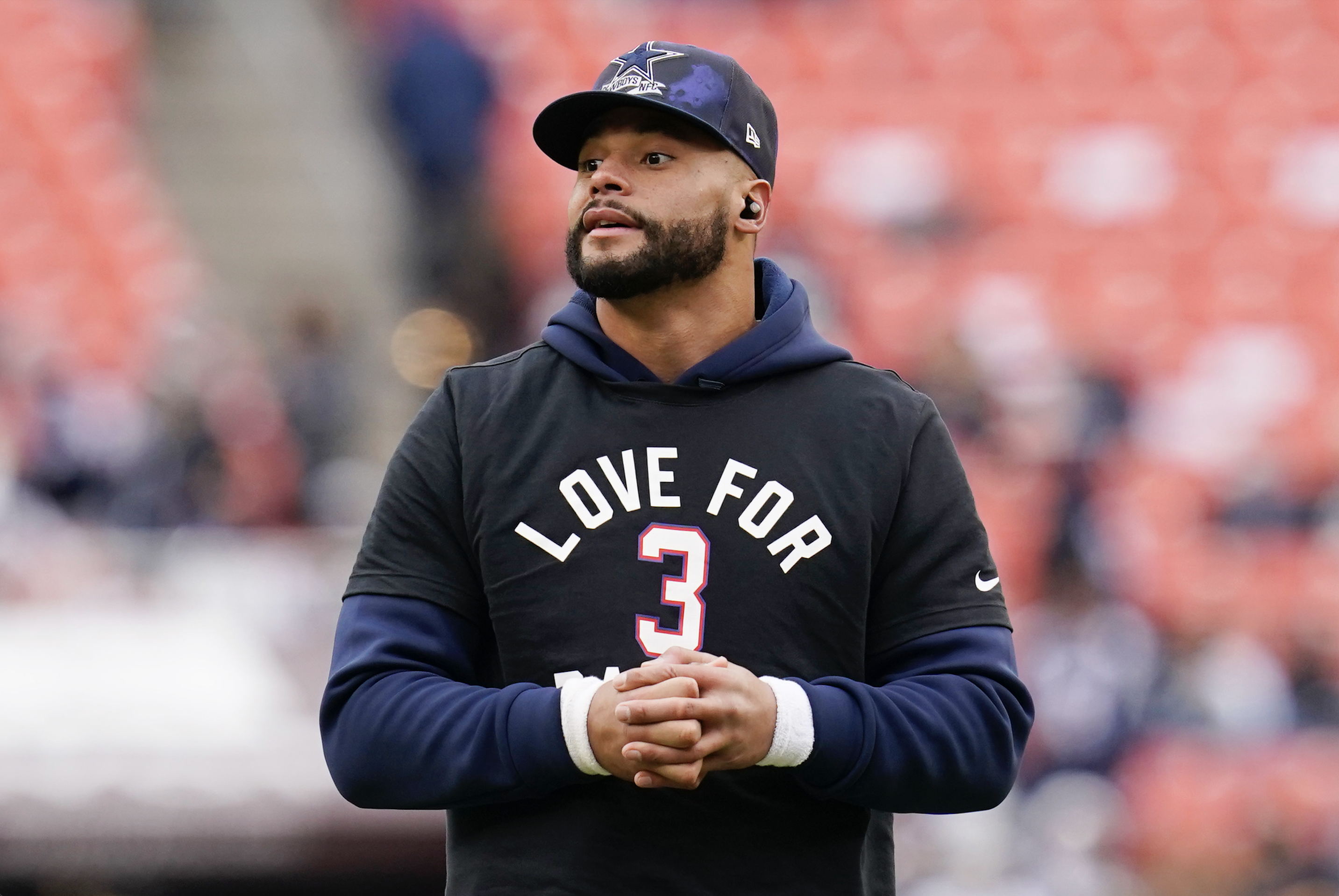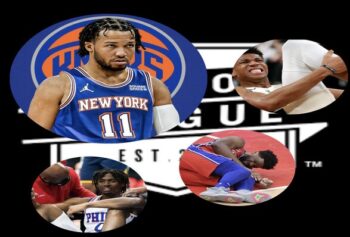(Editor’s Note: We ask serious questions here. If you weren’t aware, hurry up and get familiar.)
Question 1. Monday night’s game featured both Cam Newton and Mike Vick — two of the biggest members of the “black protectionism” club. Regardless of what they do, they are championed by many members of the black media or really just large numbers of black people in general. It’s a sweeping generalization only if you are in denial. So the question is, why are these two so protected?
SANDY DOVER: I don't believe they're unrighteously protected (or defended – and to note, protectionism isn't 'just a black thing'.) What I do believe is that they are talented quarterbacks who are scrutinized in measures that are euphemistic. The subterfuge of false equality in sports is real. At least to me. Remember too, that African Americans celebrate more than just the player, we celebrate the whole package, even a flawed package. Vick and Newton are star athletes who are trying to ascend. African Americans can appreciate that idea in and of itself.
MAURICE BOBB: Sandy just spit a mouthful of truth. There’s an inherent instinct to protect “our own” dating back to when we had to do it like Malcolm—by any means necessary. Players like Cam and Vick speak to us because most of us can relate to the idea of being built up and torn down for a lot less than what it would take to tear down their white counterparts.
J.R. GAMBLE: The QB is a revered position in sports. Signal callers are lauded as regal ballers, fearless, intelligent leaders and superstars. Historically, black NFL QBs of any talent level are rare. When one of our own ascends to Cam and Vick’s lofty status, we tend to be personally protective of their position and public image. The flip side is, we also unrealistically expect them to be God-like, which creates a tumultuous love-hate relationship.
VINNIE GOODWILL: Our reactions, or our "love" of protection, seem to stem from the scrutiny these guys receive from the jump. A lot of times, we hear the controversy before we even begin to know their stories, which puts us and them on the defensive. Add to it the rarity of their position being one of leadership and unseen talent, we can celebrate or protect the entire package, flaws and all.
MIKE TILLERY: In three years, Newton won a JC title, snatched the Heisman from Luck, won another championship, was selected first in the draft and awarded rookie of the year. That has never been done by a QB…and he set NFL records. He should be spoken highly of. At the time Vick suffered a concussion, the combined records of Romo, Stafford, Rivers, Bradford, Ponder, Gabbert, Palmer and Dalton was 26-40. There is no national narrative calling for their jobs.
Question 2. Granted, few of us believe in the term “post-racial” and yet some people refuse to leave that old school baggage behind when it comes to defending players, even when they mess up? Case in point, Tyrann Mathieu. I mean, he didn’t deserve our sympathy, did he?
SANDY: I believe a young kid like Tyrann Mathieu needs help. He needs support. And no one is helped when we start condemning college kids with drug issues, no matter how they facilitate their weaknesses. Not that he isn't accountable, but drug abuse is a real thing. Talented athletes aren't immune to pressures, especially the young. It's not about what he deserves. He needs some sympathy and a little grace.
GAMBLE: Mathieu doesn’t deserve our sympathy for being a pothead, but the tale of the promising black athlete, who didn’t make it out the hood is all too familiar. Athletics has historically been a way for blacks to gain entrance into politics, business and law. In the hood, failure is the norm. Hope comes from the few products of our environment – like Mathieu – that make it. When our “jewels” are being attacked, we fight it like a fatal disease.
MAURICE: John Lucas told me that Tyrann was like most athletes, they don’t believe they have a problem, only that they were in the wrong place at the wrong time. We give these athletes a sense of entitlement, so we can’t balk when they drink the Kool-Aid. But it’s on them. No one is forcing them to do drugs. Athletes on that level should strive for black excellence, at all times. When they don’t, don’t expect me to support black stupidity
VINNIE: Hoping for a turnaround isn't the same as excusing behavior. We tend to forget that, although college football is pro football without the paychecks, these players are still growing, maturing into themselves without the benefit of being able to make mistakes quietly, like we probably did. Nobody's defending his actions, but there’s nothing wrong with hoping his excellence in life matches with his excellence on the playing field–no matter how stupid the infraction is.
TILLERY: Who defended Tyrann Mathieu? Who would defend him? He's talented, but troubled. This is a field that criticizes good cats undeservedly and praises assholes. We're in the locker room. We know what goes on in the lives of athletes. Good or bad. The concern is what is printed and what is not. If we know this is all about the dough, then why are we so taken aback when readers sniff out the hypocrisy?
Question 3. What’s the over/under of years before we are at the point where we don’t care about lining up for people in this manner? Regardless of what mainstream society says, when are we going to be at the point where we go, “You know what, that’s on him, I don’t care one way or another”?
SANDY: African Americans have long practiced individual opinion, but context means everything. Terrell Owens is a jerk and a bad teammate, and ALL people give it to him. Michael Vick and Cam Newton are great talents with so-so teammates, but THEY become pariahs by comparison to others who have worse fortune. That's why many African American fans unify. It's a matter of context. The sports realm is littered with fear and prejudice.
GAMBLE: For the most part we are at that point. Doug Williams won his Super Bowl already. Brothers in Denver will never root for the Redskins again. I didn’t see NY cats rocking “Free Plax” shirts while he sat in prison for shooting himself. Race will always be an issue to the minority group. For example, once half of the NFL’s QBs and head coaches are black, the NFL will no longer have to legislate racial fairness.
MAURICE: I don’t think that day will ever come. The wounds run too deep in the black community. Sometimes, black professionals live in a bubble, but in the barbershops, it’s a completely different outlook. These guys are in the trenches, swimming in the nuance of racism that we sometimes miss. They won’t let the arbiters of contrition tear down their heroes, too. Charles Barkley told us athletes aren’t role models, but they continue to be in the black community. There is a bit of an Obama effect, but we still hold the highest regard for our pro ballers and rappers.
VINNIE: To say that two generations after the Civil Rights Movement is enough to make us forget or to get us to stop supporting each other is a fallacy. Now, there will be fewer of us who'll be quick to automatically defend without context and as tribalism suggests, people support and defend their own, contextualizing so-called flaws and faults. I don't remember anybody riding for Rae Carruth, yanno?
TILLERY: Blacks think death in the context of racism. Not enough time has passed. Post traumatic stress from the effects of slavery are omnipresent. Is this asked of other races? Others don't protect themselves? Why are blacks held to yet another unrealistic expectation, as if it's not a relevant survival tactic in all humans? Voters didn't pull the lever for Romney simply because he looked like them? Bulls**t. Why should we suffer fools shying away from the unrelenting mirror?
Question 4. We know the upside of black protectionism (namely, taking care of what some of us call “our own” and making sure the narrative is fair), but what is the downside of unearned support? How is it harmful?
SANDY: Black protectionism is a product of a historically racist society. It's reactionary. It's a way that African Americans have coped and unified to defend those who haven't been judged fairly, but the downside is that it can be extremist (like any other idea) and call to attention any questionable offense that focuses on African Americans – even if said people weren't in the line of bias.
GAMBLE: The downside is it can inflate the perception of the athlete’s actual impact and skill-level. It’s not a black thing, though. Every group with a vested interest in a particular athlete rocks like this. The religious nuts and suck–up media made Tim Tebow an icon. Somewhere along the line, the celebrity of being a great guy created the false perception that he was a great player. Overblown love, like the type Tebow gets, forces blacks to even the score by setting special standards for their own icons.
MAURICE: The downside of black protectionism is that you can bet on the wrong horse and look crazy for doing it. We’ve seen this happen countless times with people like O.J. Simpson. But the bad doesn’t outweigh the good. If the black community doesn’t step up and support its own, who will? I’ve seen way too many get treated unfairly in the media or by authorities. The ish they tried to pull with Trayvon Martin still makes my blood boil.
VINNIE: The downside is, it gives the fools that look like us the license to clown, but then also expect support, because we have the same skin color. There are bad apples and frauds in every race and every line of work, so black athletes are no exception. If we universally back everyone without the benefit of knowledge and perspective, it'll make it that much more difficult for those who come behind them. We have to be careful.
TILLERY: No one should receive anything undeserved. I turn away interviews often because I am not a public relations mouthpiece. If anyone is using their words to protect and further the careers of anyone that is a piece of trash, they don't belong in the field. The misnomer is writers like myself put others down to uplift my own. That's incredibly inaccurate. I just speak the facts and let others make their own distinction.
Question 5. Of the new up and coming athletes, whom do guys see as the next generation of beloved athletes? The guys (or women) who, regardless of whom or what, connect in an emotional way to the fan base. We’ve seen some players get shunned (McNabb, ‘Bron after he left Cleveland), so what constitutes the adoration and what young player is next up to be a fan favorite of the black protectionism set?
SANDY: Black protectionism always involves a tragic hero, someone who fails to translate a comprehensive meaning to the masses, regardless of his notable talent. I'm not up for nominating any new candidates for that 'honored' position, but Mathieu is already tragic in some way. And the fans and media aren't quite sure how to process him.
GAMBLE: Black protectionism starts with an athlete whose swag captivates the younger generation. Then, mainstream media labels the beloved athlete as flawed. Soon, the elderly and scholarly blacks – who don’t care for the athlete’s lifestyle, but acknowledges the athlete’s influence on the young heads – begins to dismiss any negative opinion about the athlete as bigoted jealousy. Derrick Rose can be that next dude if he brings Chi-Town a chip and steps up his humanitarian efforts.
MAURICE: For me, that next guy has to be RGIII. He’s got it all, talent, charisma, marketability. But if he has an off year, watch out. The accolades poured in like a tsunami last year for Cam. Now, it’s like he’s the biggest bust to hit the league. That makes no sense. Sure, we “protected” guys like JaMarcus Russell and Vince Young, but then we learned that it was on them. But with Cam? We know he works hard and wants it.
VINNIE: Being good enough for Main Street is one thing. Having enough style for Front Street is another. Derrick Rose seems to possess a certain knowledge yet naiveté that will make us protect him – and he's coming off a career-altering injury. He hasn't unleashed his charisma, but he has shown us his passion, emotion and willingness to take the road less traveled. He'll have the important voices backing him and he has the demeanor to handle it, same as RGIII.
TILLERY: I'm not comfortable with the term black protectionism. Writers and fans alike should understand every human has creases in the armor. If we consistently point to these faults, how will the masses be able to discern the person from the performance? McNabb and LeBron were straight objectified and neither has a criminal past. It's up to individuals to know right from wrong and anyone committed to doing the right thing should be highlighted.



